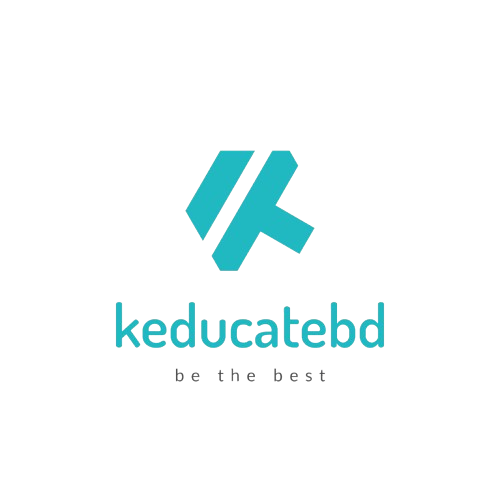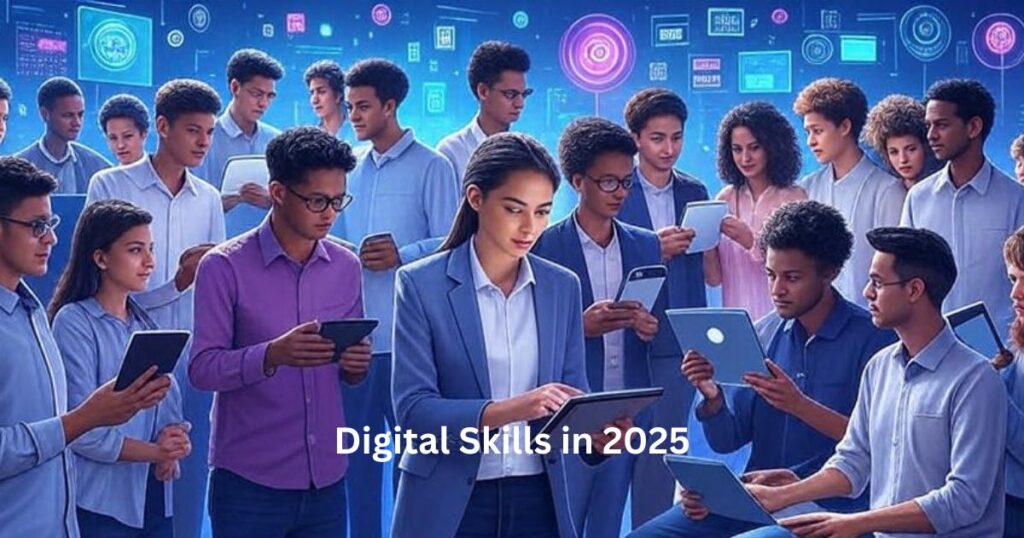Introduction-
Did you know that over 90% of jobs in 2025 will require some kind of digital skills? That’s a huge number! The world is changing fast because of technology, and things like artificial intelligence (AI), working from home, and online businesses are becoming a big part of our lives. Digital skills are like superpowers that help you do better at school, work, or even when starting your own projects. In this article, we’ll talk about the top digital skills you should learn in 2025 to succeed in this fast-moving world.
The Rise of Digital Economy
Back in 2010, smartphones were just becoming popular, and the internet wasn’t as big as it is now. Fast forward to 2025, and almost everything we do—shopping, learning, working—happens online. This change is called the digital transformation. Today, many people work from home or in hybrid setups (partly at home, partly in the office). Machines and software, like AI, are doing tasks that humans used to do, like sorting data or answering customer questions. Knowing digital skills is like having money in your pocket—it helps you get jobs, work with others across the world, and stay ahead in the global marketplace.
Top Digital Skills for 2025
Here are the top 10 digital skills you should know to shine in 2025. Don’t worry if they sound complicated—we’ll break them down in simple terms!
1. Artificial Intelligence and Machine Learning (AI/ML)
Why it matters: AI is like a super-smart computer that can think and learn a little like a human. It’s used in healthcare (to predict diseases), finance (to spot fraud), and marketing (to suggest products you might like).
What to learn: You don’t need to be an expert. Start with understanding what AI can do, like recognizing images or answering questions. If you’re curious, you can learn to create simple AI programs later.
Where to start: Try free courses on platforms like Coursera or Google AI. They have beginner-friendly lessons to get you started.
2. Data Literacy and Data Analysis
Why it matters: Data is everywhere—think of it as information, like how many people visit a website or what products sell the most. Knowing how to read and understand data helps you make smart decisions.
What to learn: Learn to use tools like Microsoft Excel (for spreadsheets), SQL (for databases), or Power BI and Tableau (for cool charts).
Real-life use: Businesses use data to plan better, schools use it to track student progress, and even cities use it to manage traffic.
Where to start: Check out free tutorials on YouTube or courses on Khan Academy.
3. Cybersecurity Awareness
Why it matters: Hackers can steal information or mess up your computer. Cybersecurity is about staying safe online.
What to learn: Simple habits like creating strong passwords, spotting fake emails, and keeping your data private.
Real-life use: Protects your personal info, like bank accounts or social media.
Where to start: Try Google’s Cybersecurity Certificate or free lessons from CompTIA Security+ to learn the basics.
4. Cloud Computing
Why it matters: Cloud computing is like storing your files in an online “cloud” instead of on your computer. Big companies like Amazon (AWS), Microsoft (Azure), and Google use it to store tons of data.
What to learn: Understand how to use cloud tools like Google Drive or Microsoft OneDrive for teamwork. Later, you can explore AWS or Azure for bigger projects.
Real-life use: Helps you work with teams online and can lead to high-paying tech jobs.
Where to start: AWS and Google Cloud offer free beginner courses.
5. Digital Marketing
Why it matters: Digital marketing is how businesses reach people online—through ads, social media, or emails. It’s a great skill for anyone who wants to start a business or work freelance.
What to learn: Learn about SEO (making websites show up on Google), social media posts, and creating ads. Tools like Google Analytics, Canva, and Buffer make it fun and easy.
Real-life use: You could help a small business grow or even promote your own projects.
Where to start: HubSpot Academy has free digital marketing courses.
6. Web Development and Low-Code Tools
Why it matters: Websites are the backbone of the internet. Knowing how they work helps you create your own or fix them.
What to learn: Start with HTML (for structure), CSS (for design), and JavaScript (for interactivity). You can also try no-code tools like Webflow or WordPress, which let you build websites without coding.
Real-life use: Build a blog, a portfolio, or even a small business website.
Where to start: Try freeCodeCamp for coding or Webflow University for no-code tools.
7. Digital Communication & Collaboration Tools
Why it matters: Many teams now work online, so you need to know tools like Slack, Zoom, or Microsoft Teams to chat and share work.
What to learn: How to send clear messages, share files, and act professionally online (like muting your mic on Zoom!). Asynchronous communication (like sending messages people reply to later) is also key.
Real-life use: Helps you work on group projects or jobs from anywhere.
Where to start: Most tools have free tutorials on their websites.
8. UI/UX Design
Why it matters: UI (user interface) is how a website or app looks, and UX (user experience) is how easy it is to use. Good design makes apps fun and simple.
What to learn: Use tools like Figma or Adobe XD to design app layouts or websites.
Real-life use: Companies need designers to make their apps user-friendly.
Where to start: Figma has free tutorials, and Coursera offers UX design courses.
9. Project Management Software Proficiency
Why it matters: Project management tools help you organize tasks and work with teams. They’re super useful for school projects or jobs.
What to learn: Use tools like Trello, Asana, or Monday.com to track tasks. Learn about Agile or Scrum, which are ways to manage projects efficiently.
Real-life use: Helps you stay on top of deadlines and lead teams.
Where to start: Trello and Asana have free beginner guides.
10. Digital Creativity & Content Creation
Why it matters: People love watching videos, listening to podcasts, or seeing cool graphics online. Content creation is a big part of the “creator economy,” where people make money from their creations.
What to learn: Use Canva for graphics, CapCut for video editing, or Audacity for podcasts.
Real-life use: Start a YouTube channel, make Instagram posts, or create a podcast.
Where to start: Canva and CapCut have free tutorials on their websites.
Emerging Bonus Skills
Here are a few extra skills that are becoming popular:
- Blockchain and Web3: Blockchain is like a super-secure digital record used for things like cryptocurrencies. Web3 is the next version of the internet, focused on privacy and ownership. Start with free courses on Binance Academy.
- Prompt Engineering: This is about writing clear instructions for AI tools like ChatGPT to get the best results. Try experimenting with free AI tools to practice.
- Metaverse Navigation: The metaverse is like a virtual world where people meet or work. Learn to use platforms like VRChat or create virtual spaces with tools like Unity.
How to start Learning these Skills
You don’t need to be a tech genius to learn these skills! Here’s how to begin:
- Learning Platforms: Use free resources like YouTube, Khan Academy, or freeCodeCamp. Paid platforms like Coursera, Udemy, or LinkedIn Learning.
- Self-Paced vs. Structured: Self-paced means learning at your own speed (like watching videos). Structured means following a course with deadlines. Try both to see what works for you.
- Certifications: Get certificates from places like Google, CompTIA, or Coursera to show off your skills.
- Practice: The best way to learn is by doing. Create a website, make a Canva poster, or analyze data for a school project.
Conclusion
Digital skills aren’t just for tech experts—they’re for everyone. They’re like survival skills for 2025, helping you get better jobs, work smarter, and create new things. Start by picking 2–3 skills from this list to focus on in the next 6 months. Over time, these skills will make you more confident, adaptable, and ready for the future.
Call to Action
Which skills are you excited to learn this year? Share your thoughts in the comments! For weekly tips on learning digital skills, subscribe to our newsletter. Check out the resources below to start your journey:


